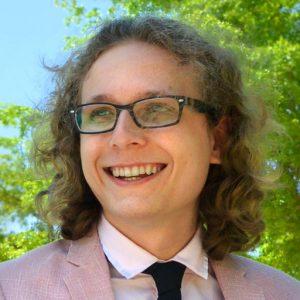Adam Johnson earns scholarship for thesis work

When New College student Adam Johnson was writing his 2021 senior thesis—a paper entitled Charrettes, Urban Planning and Democracy—he didn’t expect the local community to take major notice.
But his insightful text spoke directly to planners invested in the future of sustainable cities, and his vision earned him the student scholarship award from the Florida Planning and Zoning Association (FPZA) Gulf Coast Chapter.
“I’m incredibly grateful to have been selected for the scholarship. I really believe design charrettes hold the potential to fundamentally change how we create our cities,” said Johnson, a sociology and political science student who received the award this month and will graduate in May. “Charrettes deserve to be taken seriously, and they should be researched further as tools for local democracy.”
In the context of urban planning, a “charrette” is a design process that engages all stakeholders of a proposed project (community members, developers, city staff and officials) in a series of meetings and interactive workshops to collaboratively create a plan. Johnson believes these meetings allow all sides to be heard and enable cities to equitably move forward.
“Charrettes are not only more democratic than typical public participation, but they can help us get past barriers, such as land-use regulation and NIMBYism to create the sustainable city of the future,” Johnson said. “It’s very fulfilling to be able to hopefully make a small but notable impact with my research, which is all I can really ask for.”
So what does it mean that the FPZA has officially recognized Johnson’s work in this regard? First off, it offers Johnson visibility, as his paper will be published in the organization’s quarterly Overview newsletter (the winter edition for January/February). The FPZA is part of the larger American Planning Association (which “provides leadership in the development of vital communities for all by advocating excellence in planning, promoting education and resident empowerment”) and has more than 40,000 members from 90 countries. Johnson also received $500 for the FPZA scholarship, which he will use to offset graduate school costs.
It took a tremendous amount of work for Johnson to get to this point, including quite a bit of collaboration with David Brain, Ph.D., the director of the Urban Studies Program, and a professor of sociology and environmental studies at New College.
Johnson began working with Brain as a research assistant in the fall of 2019, on a project funded by the Axel and Margaret Ax:son-Johnson Foundation for Public Benefit and the KTH Royal Institute of Technology in Stockholm, Sweden. One of Johnson’s roles has been to help compile research articles on public space and organize them into a database, which will be publicly launched in early 2021.
But this was not the first time Johnson collected and analyzed data. During an Independent Study Project (ISP) in January 2020, Johnson conducted a content analysis of public comments presented to the City of Sarasota regarding a mixed-use development project before and after a design charrette. He is also the vice president of New College’s Democracy Matters chapter.
Brain’s mentorship has undoubtedly been integral to Johnson’s understanding of urban policy. The professor’s research centers on urban planning—specifically the processes of public engagement and the way the New Urbanist movement has relied on charrettes for design-centered collaboration.
He is not at all surprised that Johnson earned the FPZA scholarship.
“Adam is an exceptionally strong student. His work is characterized by a clarity, rigor and a sophistication far beyond most undergraduate researchers,” Brain said. “Adam has done a brilliant job of designing a research project that enables him to examine the ways that a charrette process changes the public discourse around planning projects.”
What’s next for Johnson? He is currently applying to master’s degree programs with focuses on urban issues, political science and public policy.
In Johnson’s words: “I have a lot of interests outside of the city too, but the city is connected to so much that is critical to political action moving forward—housing, transportation, climate change, etc.—that I’ve found myself coming back to it as a nexus of all these issues that’s ripe for research.”
Abby Weingarten is the senior editor in the Office of Communications & Marketing.
